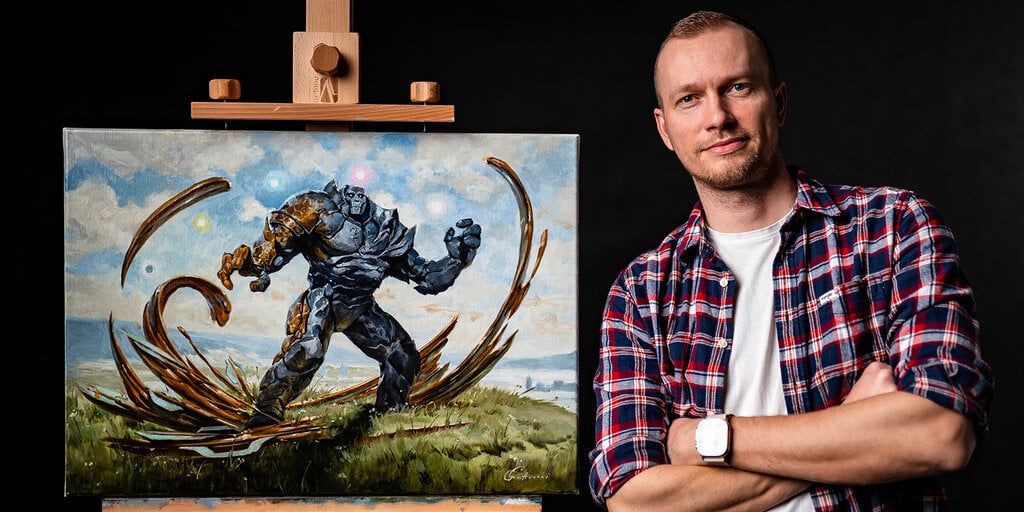Greg Rutkowski, a digital artist known for his surreal style, opposes AI art but his name and style have been frequently used by AI art generators without his consent. In response, Stable Diffusion removed his work from their dataset in version 2.0. However, the community has now created a tool to emulate Rutkowski’s style against his wishes using a LoRA model. While some argue this is unethical, others justify it since Rutkowski’s art has already been widely used in Stable Diffusion 1.5. The debate highlights the blurry line between innovation and infringement in the emerging field of AI art.



deleted by creator
@raccoona_nongrata @fwygon
Rutowski, Monet, and Rockwell could also not create without human art.
All creativity is a combination of past creativity.
Even Monet.
Even Shakespeare.
Even Beethoven.
deleted by creator
@raccoona_nongrata
Actually. It is necessary. The process of creativity is much much more a synergy of past consumption than we think.
It took 100,000 years to get from cave drawings to Leonard Da Vinci.
Yes we always find ways to draw, but the pinnacle of art comes from a shared culture of centuries.
deleted by creator
@raccoona_nongrata
A machine will not unilaterally develop an art form, and develop it for 100,000 years.
Yes I agree with this.
However, they are not developing an art form now.
Nor did Monet, Shakespeare, or Beethoven develop an art form. Or develop it for 100,000 years.
So machines cannot emulate that.
But they can create the end product based on past creations, much as Monet, Shakespeare, and Beethoven did.
deleted by creator
@selzero @raccoona_nongrata @fwygon But human creativity is not ONLY a combination of past creativity. It is filtered through a lifetime of subjective experience and combined knowledge. Two human artists schooled on the same art history can still produce radically different art. Humans are capable of going beyond has been done before.
Before going too deep on AI creation spend some time learning about being human. After that, if you still find statistical averages interesting, go back to AI.
@glenatron @raccoona_nongrata @fwygon
I mean, yes, you are right, but essentially, it is all external factors. They can be lived through external factors, or data fed external factors.
I don’t think there is a disagreement here other than you are placing a lot of value on “the human experience” being an in real life thing rather than a read thing. Which is not even fully true of the great masters. It’s a form of puritan fetishisation I guess.
@selzero @raccoona_nongrata @fwygon I don’t think it’s even contraversial. Will sentient machines ever have an equivalent experience? Very probably. Will they be capable of creating art? Absolutely.
Can our current statistical bulk reincorporation tools make any creative leap? Absolutely not. They are only capable of plagiarism. Will they become legitimate artistic tools? Perhaps, when the people around them start taking artists seriously instead of treating them with distain.
@glenatron @raccoona_nongrata @fwygon
This angle is very similar to a debate going on in the cinema world, with Scorsese famously ranting that Marvel movies are “not movies”
The point being without a directors message being portrayed, these cookie cutter cinema experiences, with algorithmically developed story lines, should not be classified as proper movies.
But the fact remains, we consume them as movies.
We consume AI art as art.
@selzero @glenatron @raccoona_nongrata @fwygon And thousands of people’s creativity is in the Marvel movie, but one person hammering out a prompt on the AI art. They’re still vastly different. Even the most banally corporate movie is still a work of staggering human creativity and _working together_.
Stable diffusion image generators are not.
@aredridel @glenatron @raccoona_nongrata @fwygon
Humans are also machines, biological machines, with a neurology based on neurons and synapse. As pointed out before, human “creativity” is also a result of past external consumption.
When AI is used to eventually make a movie, it will use more than one AI model. Does that make a difference? I guess your “one person” example is Scorsese’s “auteur”?
It seems we are fetishizing biological machines over silicon machines?
@selzero @glenatron @raccoona_nongrata @fwygon no. Human relationships of cocreation over purely extractive ones. It’s not the biology (though humans have human relevant social drives simple algorithms don’t), it’s the relationships.
It’s obscuring that as if these clusters of Gpus care about creating and form relationships based on them that is so offensive.